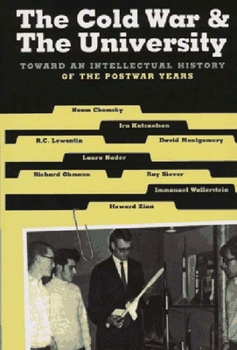The Cold War & the University: Toward an Intellectual History of the Postwar Years
Select Format
Select Condition 
Book Overview
The years following 1945 witnessed a massive change in American intellectual thought and in the life of American universities. The effort to mobilize intellectual talent during the war established new... This description may be from another edition of this product.
Format:Hardcover
Language:English
ISBN:1565840054
ISBN13:9781565840058
Release Date:November 1996
Publisher:New Press
Length:258 Pages
Weight:1.35 lbs.
Dimensions:1.1" x 6.4" x 9.5"
Customer Reviews
4 ratings
We need a society based on human values, other than buying and selling (N. Wiener)
Published by Thriftbooks.com User , 14 years ago
The most important events in the US during the Cold War were McCarthyism and the Vietnam War. But there were also other important issues, like research and field work funding or ideology. As L. Nader rightly remarks, `repressive and fear generating events such as the cold war periodically appear, thereby facilitating industrial and military regulation of academic affairs.' For N. Chomsky, the all important issue is `to reduce the threat of democracy and to establish more firmly the Madisonian principle on which the US was founded: that the prime responsibility of government is to protect the minority of the opulent against the majority.' McCarthyism For, R. Lewontin, there was direct influence on academic affairs, because of `opportunism and cowardice of boards of trustees and university administrators.' There was passive acceptance of firings, blacklistings, attacks on unions and harassment. (H. Zinn) Ex-communists named names. Hundreds of teachers lost their job; many left the country; some committed suicide. (L. Nader) Research and field work Research became more and more `militarized': geophysics and oceanography (R. Siever), the social sciences (I. Wallerstein) or anthropology (L. Nader). In the face of US anti-State ideology, the codeword for grants was `war': war on cancer, on diseases, on poverty or on drugs (R. Lewontin). Fieldwork by anthropologists was used in counterinsurgency, for expulsion of people out of areas with oil reserves, for testing of atomic technology on small human populations, for monitoring political loyalty and for creating a climate of intellectual repression. (L. Nader). Ideology A general silence about the Cold War reigned among historians. But some went beyond silence by distorting the truth out of national loyalty. (H. Zinn) In `English Literature', academics turned to timeless universals (love, death, art) and didn't cover such notions as `history, race, class conflict, empire, power or privilege.' (R. Ohmann) This mixed collection of essays is a most valuable contribution to the history of the Cold War. It is a must read for all those interested in US history.
A very important compilation
Published by Thriftbooks.com User , 21 years ago
Viewing a political era from a particular point of view, from a subjective perspective can often manage to shed light on much more. The experiences reported by the individuals in this book are extremely well written stories that transcend the bounds of what at first seems a narrow topic. Still, if you have a particular interest in education and the politics of universities and colleges, you will find this book even more intriguing.
Correction
Published by Thriftbooks.com User , 23 years ago
Just a note on the review by the reader from New York posted on May 5, 1999: Laura Nader's mention of Eric Wolf's stealing documents was in fact a misprint inserted by an editor. It's a long story, but I'm fairly certain of its validity. I've taken classes with her at UC Berkeley and in a discussion of the book she went out of her way to point out the error. Understandibly, she was quite upset.
A valuable contribution to the history of the cold war
Published by Thriftbooks.com User , 24 years ago
A fine collection of essays, particularly those of Howard Zinn, R.C. Lewontin, and Noam Chomsky. The introduction by David Montgomery is also quite good, mixing, as many of the essays do, personal recollections of working in the university system, with historical research.




